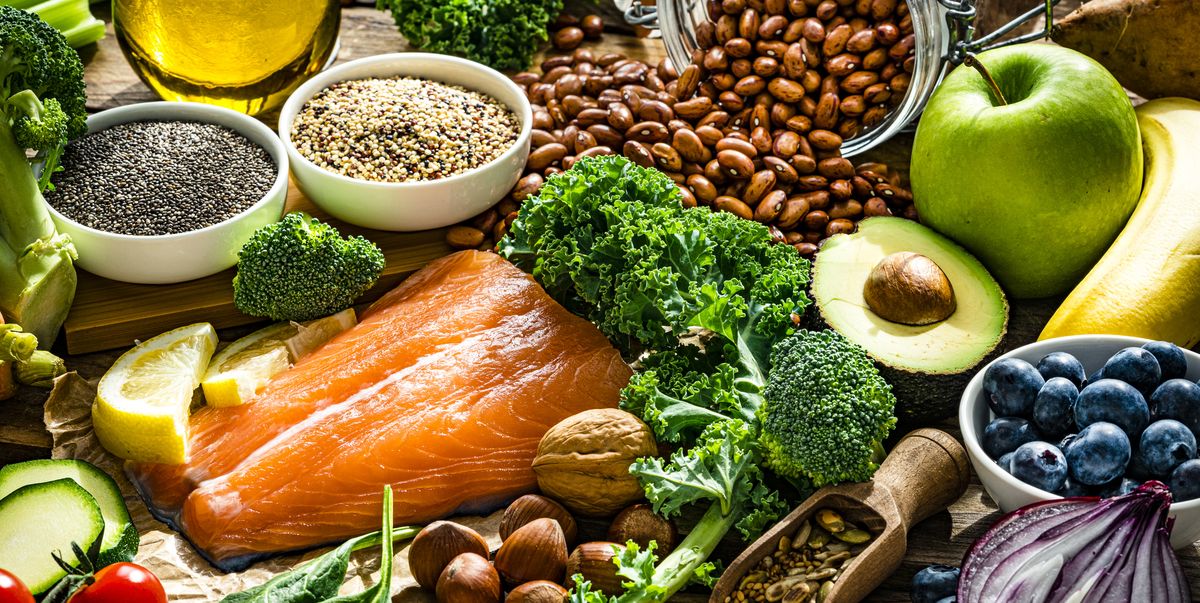The term “superfood” gets tossed around a lot these days, but you might be wondering: What are superfoods, and what makes them, well, so “super?”
There are foods that lower cholesterol, foods for brain health, and so many more out there that boost longevity. While there is no official definition of a “superfood,” generally, they are nutrient-dense ingredients that pack a punch when it comes to health benefits, often providing vitamins, minerals, antioxidants, or other properties that support overall wellness. While no single food is a magic bullet for perfect health, incorporating superfoods into a balanced diet will certainly give your body some extra love.
What’s even better is that superfoods are simple, affordable, and already staples in everyday cooking. From the humble egg to ancient grains, the array of superfoods offers something for everyone, no matter your taste or dietary needs.
Below, we’ve compiled a list of options to consider adding to your meals, along with why they deserve a spot on your plate.
Mushrooms
Mushrooms have earned their place as a superfood due to their amazing nutritional benefits and unique compounds. They are the only item in the produce aisle that naturally contains vitamin D when exposed to sunlight, making them a great way to support bone health. Many mushrooms are also packed with ergothioneine, a powerful antioxidant that helps protect your cells from damage and support overall wellness. Additionally, they contain beta-glucans, which are known to support the immune system and heart health and may support healthy blood sugar management. With so many varieties to choose from, like shiitake, portobello, cremini, and oyster mushrooms, each type offers a unique flavor and texture, making it easy to incorporate into soups, stir-fries, salads, and more.
Macadamias
These delicious nuts are packed with healthy monounsaturated fats, which support heart health and help lower “bad” cholesterol levels. They also provide a source of dietary fiber, aiding in digestion and helping you feel fuller, longer.
Macadamias are rich in antioxidants, like vitamin E, which help fight free radicals in the body and protect cells from damage. And, they contain essential nutrients like magnesium and potassium, which are important for maintaining healthy muscles and nerves. One study found that macadamias are not linked to major changes in weight, body fat, waist size, or blood sugar levels, while they may offer the body a boost of key nutrients. Overall, eating macadamia nuts daily didn’t cause weight gain and may help reduce cholesterol, similar to effects seen with other nuts. Their creamy texture and subtle flavor make them not only nutritious but also incredibly versatile, pairing perfectly with both sweet and savory dishes.
Eggs
Affordable, versatile, and packed with nutrients, eggs are one of nature’s ultimate superfoods. They’re a natural source of high-quality protein, plus they provide choline, a key nutrient for brain health. Toss them into breakfast scrambles, salads, or even baked goods for a boost of nutrition.
Prunes
Prunes are a powerhouse when it comes to digestion. Packed with fiber and naturally occurring sorbitol (a sugar alcohol), they help keep your gut happy and running smoothly. Additionally, they’re brimming with antioxidants and nutrients like potassium and vitamin K, which support bone health. Data shows that eating 50 grams of prunes daily (about four to six prunes) is linked to positive bone health outcomes among postmenopausal women.
Cranberries
Cranberries, known for their tart flavor, are loaded with vitamin C and powerful antioxidants called proanthocyanidins, which help support urinary tract health. Additionally, these berries may contribute to heart health by helping to combat inflammation, while their rich antioxidant profile helps protect cells from damage caused by free radicals.
Sweet potatoes
Vibrantly colored and full of flavor, sweet potatoes are a nutritional goldmine. The orange-fleshed ones are a known natural source of beta-carotene (a vitamin A precursor), which is great for eye health and skin support. They’re also a fantastic source of complex carbs and fiber to keep you fueled and satisfied. The purple varieties are especially rich in antioxidants known as anthocyanins, which can help fight free radicals in the body and support overall wellness. Meanwhile, the orange and yellow varieties are loaded with specific plant compounds like caffeic acid and chlorogenic acid, which are known for their anti-inflammatory and health-boosting properties. These natural substances make sweet potatoes not just delicious, but also a nutrient powerhouse for a healthy diet.
Olive oil
A staple in Mediterranean diets, olive oil is packed with heart-healthy monounsaturated fats and antioxidants, including vitamin E. It’s been linked to reduced inflammation and improved heart health, making it a flavorful and healthful addition to salads, roasted veggies, or even a simple dip for bread. Some data even suggests that consumption is linked to bone health support, too.
Teff
This tiny, gluten-free ancient grain has been a dietary staple in Ethiopia for centuries. Rich in fiber and protein, teff also boasts a generous amount of calcium, making it a standout for supporting bone health. Since teff has a low glycemic index, contains essential amino acids and fatty acids, and contains nutritionally balanced minerals, vitamins, and their precursors, data suggests it may be a promising food for stable blood sugars. Its nutty flavor and versatility make it perfect for porridge, baked goods, or even as a base for grain bowls.
Tuna
Tuna is a lean, protein-packed fish that’s also rich in omega-3 fatty acids, which are essential for brain and heart health. Data shows that consumption of tuna and dark-meat fish once weekly or higher was associated with a lower decline in verbal memory among a population of women. Whether fresh or canned, tuna is a convenient way to add high-quality protein and healthy fats to your meals. When choosing canned tuna, opt for brands that guarantee to be lower in mercury, like Safe Catch.
Walnuts
Walnuts are often called “brain food,” thanks to their omega-3 fatty acids and antioxidant content. Walnuts are the only tree nut that is considered to be an excellent source of ALA omega-3 fatty acids. Research suggests these nuts may support cognitive and heart health. Snack on a handful or sprinkle them over oatmeal and salads for a satisfying crunch.
Sole
Sole, a type of mild-flavored fish also known as flounder, is rich in omega-3 fatty acids, promoting heart health and reducing inflammation. Additionally, it provides essential vitamins and minerals like vitamin D, B12, and selenium, which support immune function and bone health. Sole’s low calorie and fat content make it a great choice for maintaining a balanced diet, and its quick cooking time of just four minutes per side in a pan makes it an easy and convenient option for busy weeknights.
Blueberries
Blueberries are tiny but mighty when it comes to antioxidants. Rich in anthocyanins, they support brain health and help protect your body from oxidative stress. Data shows that consumption of fresh blueberries supports post-meal glucose management, helping support healthy blood sugar levels among certain populations. (One Prevention editor ate blueberries every day for two weeks and saw these effects for herself!) Toss them into oatmeal, yogurt, or baked goods for a sweet, nutritious boost.
Kale
Kale earns its reputation as a superfood with its impressive nutrient profile. Packed with vitamins A, C, and K, along with fiber and antioxidants, this leafy green is a versatile ingredient in salads, smoothies, and stir-fries. Data shows consuming dark green leafy veggies, like kale, is linked to positive effects on cognitive function, possibly thanks to their ability to help manage inflammation.
Chia seeds
Chia seeds have been known and valued for thousands of years, dating back to the diets of the Mayas and Aztecs. These tiny seeds pack a powerful nutritional punch and are a source of omega-3 and omega-6 fatty acids, which support heart and brain health. They are also a source of soluble dietary fiber, which aids digestion, and contain a notable amount of protein and beneficial plant compounds. Thanks to their impressive nutritional content, chia seeds are often recommended to help prevent various health issues like obesity, high blood pressure, heart disease, diabetes, and even cancer.
Tart cherries
Tart cherries are a natural source of melatonin, the hormone that helps regulate your sleep-wake cycle. Research suggests that the benefits of tart cherry juice include improved sleep duration and quality, especially for those struggling with insomnia or disrupted sleep. An 8-ounce glass of tart cherry juice concentrate contains 1.08 micrograms of melatonin, a natural compound that helps regulate sleep.
These little beauties are catching fame as a helper with muscle soreness and inflammation, making them a popular recovery food among athletes. Tart cherries contain polyphenolic compounds, including flavonoids and anthocyanins, possessing antioxidant and anti-inflammatory effects.


